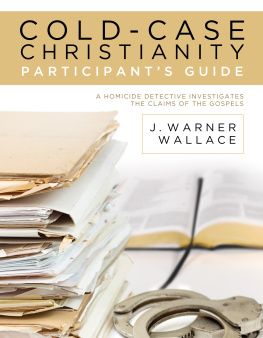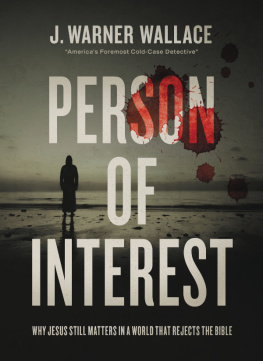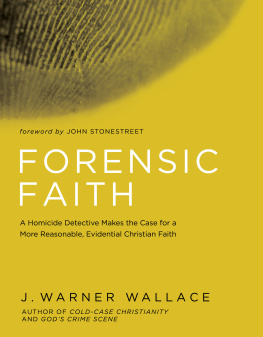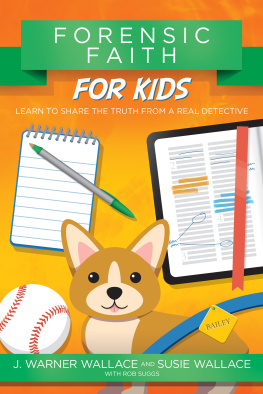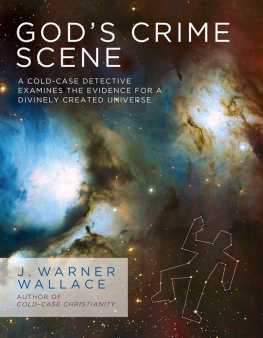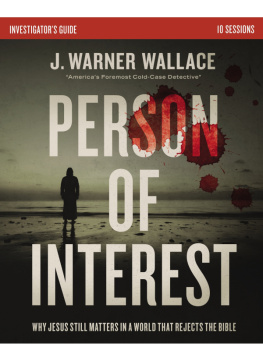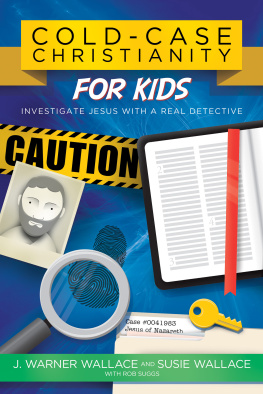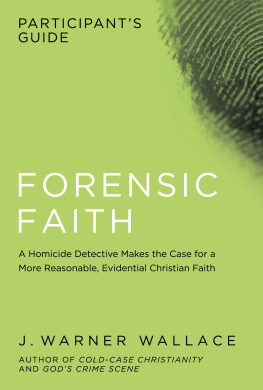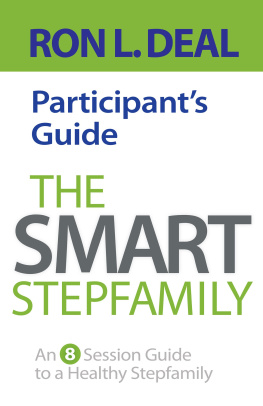COLD-CASE CHRISTIANITY PARTICIPANTS GUIDE
Published by David C Cook
4050 Lee Vance Drive
Colorado Springs, CO 80918 U.S.A.
Integrity Music Limited, a Division of David C Cook
Eastbourne, East Sussex BN23 6NT, England
The graphic circle C logo is a registered trademark of David C Cook.
All rights reserved. Except for brief excerpts for review purposes,
no part of this book may be reproduced or used in any form
without written permission from the publisher.
The website addresses recommended throughout this book are offered as a resource to you. These websites are not intended in any way to be or imply an endorsement on the part of David C Cook, nor do we vouch for their content.
Unless otherwise noted, all Scripture quotations are taken from the New American Standard Bible, copyright 1960, 1995 by The Lockman Foundation. Used by permission. (www.Lockman.org.) Scripture quotations marked ESV are taken from the ESV Bible (The Holy Bible, English Standard Version), copyright 2001 by Crossway, a publishing ministry of Good News Publishers. Used by permission. All rights reserved. The author has added italics to Scripture quotations for emphasis.
ISBN 978-1-4347-1144-1
eISBN 978-0-8307-7549-1
2018 James Warner Wallace
Published in association with the literary agency of Mark Sweeney & Associates, Bonita Springs, FL 34135.
Illustrations by J. Warner Wallace
The Team: Stephanie Bennett, Amy Konyndyk, Jack Campbell, Susan Murdock
Cover Design: Nick Lee
Cover Photo: Shutterstock
First Edition 2018
1 2 3 4 5 6 7 8 9 10
071318
Contents
Session One
Dont Be a Know-It-All and Learn How to Infer
I was thirty-five years old before I first paid attention to a pastors sermon. A fellow officer had been inviting me to church for many months, and while I was able to put him off for some time, I eventually acquiesced and attended a Sunday-morning service with my family. I managed to ignore most of what the pastor talked about until he began to paint a picture of Jesus that caught my attention. He characterized Jesus as a really smart guy who had some remarkably wise things to say about life, family, relationships, and work. I began to believe that this might be true. While I was uninterested in bowing my knee to Jesus as God, I was at least willing to listen to Jesus as a teacher. A week later I purchased my first Bible.
Something about the Gospels caught my attention, more as an investigator than as someone interested in the ancient philosophy of an imaginary sage. By this time in my life, I had already served as a patrol officer and a member of the Gang Detail, the Metro Team (investigating street narcotics), the SWAT Team, and the Crime Impact Team (investigating career criminals). I had interviewed hundreds (if not thousands) of eyewitnesses and suspects. I had become familiar with the nature of eyewitness statements, and I understood how testimony was evaluated in a court of law. Something about the Gospels struck me as more than mythological storytelling. The Gospels actually appeared to be ancient eyewitness accounts. I began carefully employing my investigative training in Forensic Statement Analysis (FSA) to the gospel of Mark. Within a month, and in spite of my deep skepticism and hesitation, I concluded that Marks gospel was the eyewitness account of the apostle Peter.
In my current assignment, I investigate cold-case murders. Unlike other lesser crimes, an unsolved homicide is never closed; time doesnt run out on a murder investigation. There are many similarities between investigating cold cases and investigating the claims of Christianity. Cold-case homicides are events from the distant past for which there is often little or no forensic evidence. These kinds of cases are sometimes solved on the basis of eyewitness testimony, even though many years have passed between the point of the crime and the point of the investigation.
Christianity makes a claim about an event from the distant past for which there is little or no forensic evidence. Like cold cases, the truth about what happened can be discovered by examining the statements of eyewitnesses and comparing them with what additional evidence is accessible to us. If the eyewitnesses can be evaluated (and their statements can be verified by what we have available), an equally strong circumstantial case can be made for the claims of the New Testament. But, are there any reliable eyewitness statements in existence to corroborate in the first place? This became the most important question I had to answer in my personal investigation of Christianity. Were the gospel narratives eyewitness accounts or were they only moralistic mythologies? Were the Gospels reliable or were they filled with untrustworthy, supernatural absurdities? The most important questions I could ask about Christianity just so happened to fall within my area of expertise.
I hope to share some of that expertise with you in this study. A quote from C. S. Lewis in his book God in the Dock has stuck with me through the years. Lewis correctly noted, Christianity is a statement which, if false, is of no importance, and, if true, is of infinite importance. The one thing it cannot be is moderately important. Christianity, if true, is worthy of our investigation.
Open the Case File
(5 minutes Consider and Answer as many Questions as possible)
How would you define the word faith?
Some people define faith as believing in something even when there isnt any evidence for it. What role do you think evidence ought to play in our Christian faith?
Think about how you became a Christian. What role, if any, did evidence play in your decision to become a Christian?
What would you say to someone who said they didnt think there was any evidence for Christianity?
View the Video Testimony
(10 minutes Take Notes)
Controlling your presuppositions (trying not to be a know-it-all)
Letting the evidence speak for itself when it comes to Christianity
Understanding the difference between possible and reasonable

